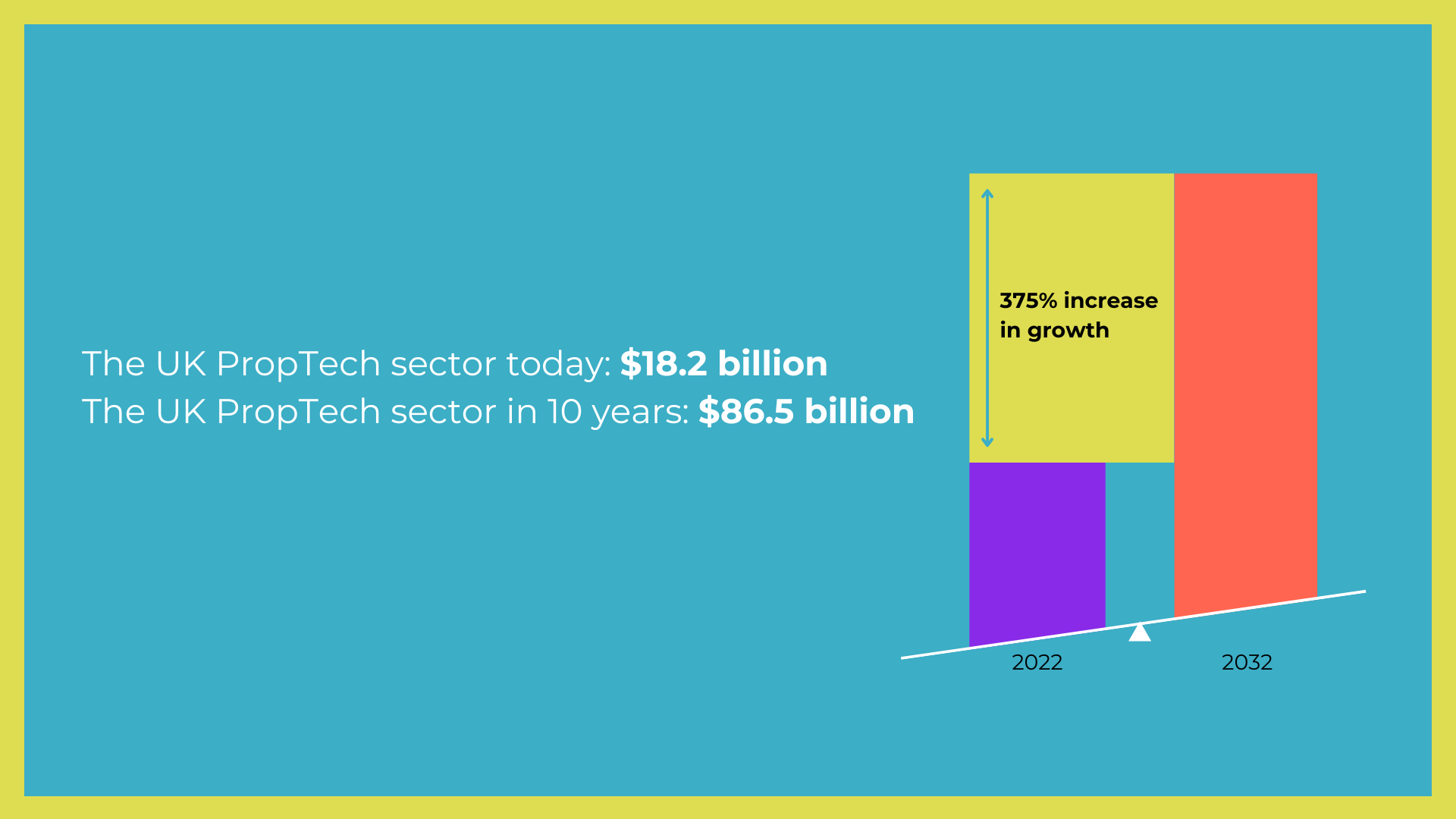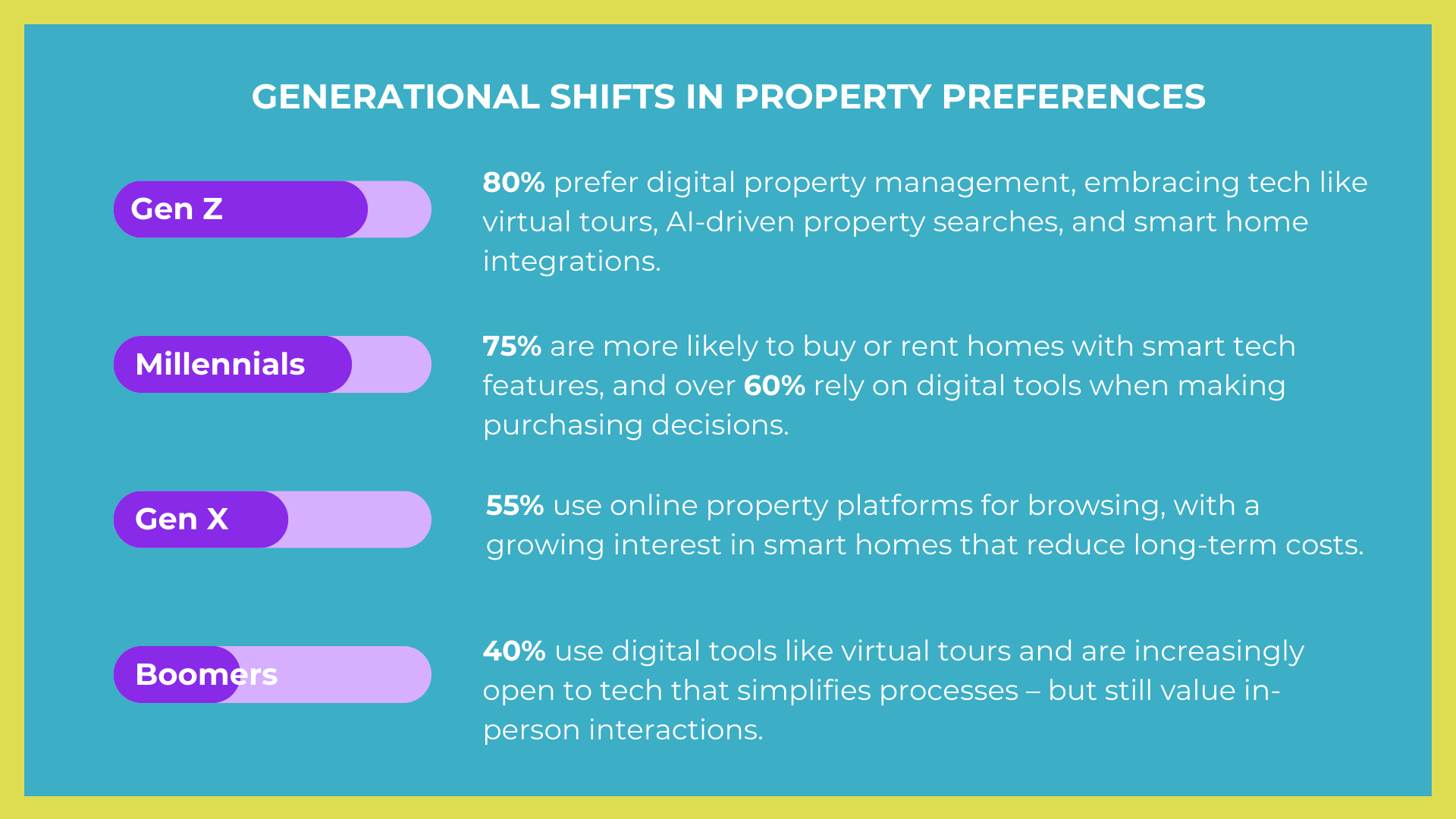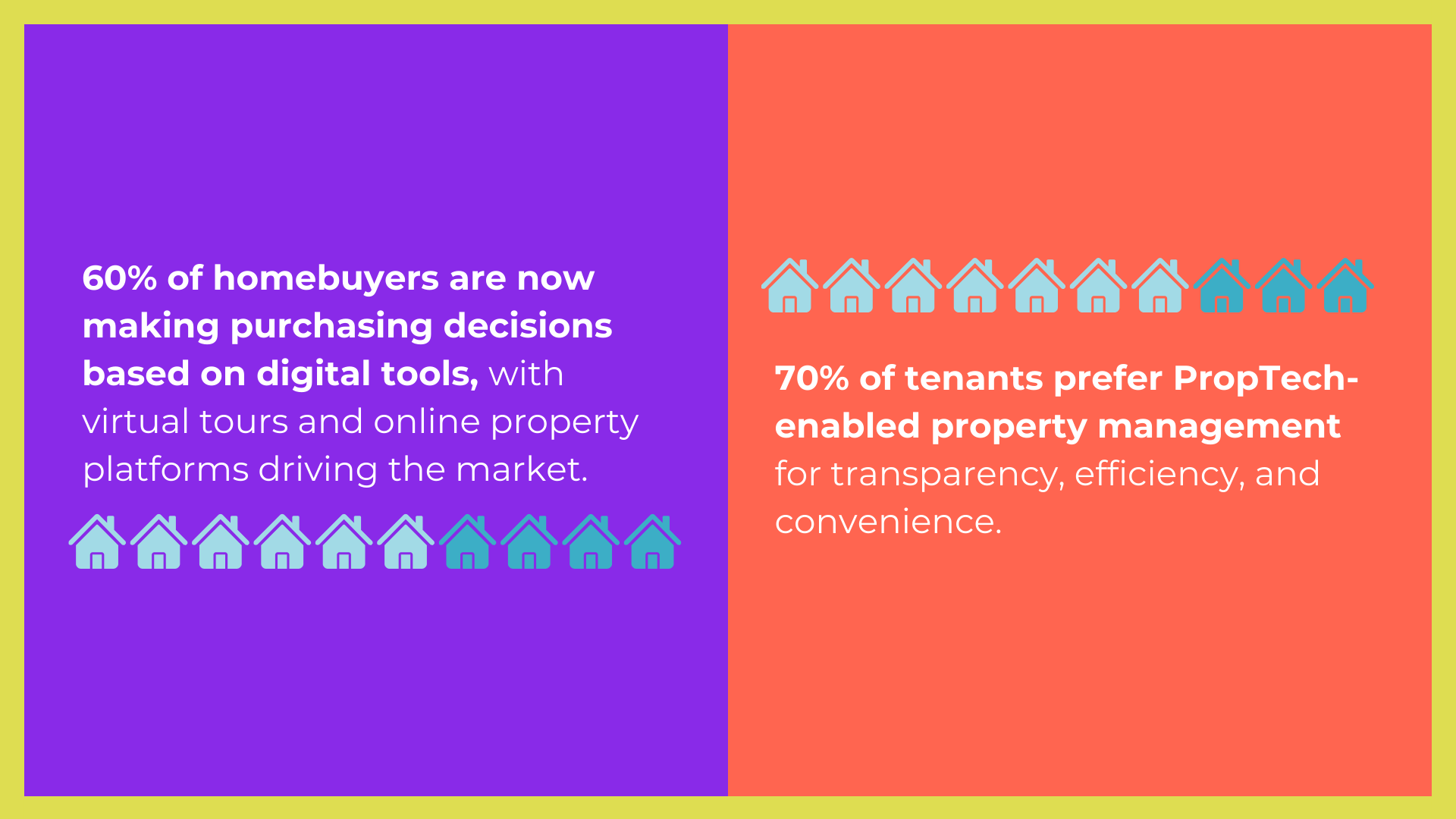Over the past few decades, digital acceleration and technological innovation have revolutionised nearly every aspect of our lives. From how we work and shop to how we learn and interact, technology has seamlessly woven itself into the fabric of modern society. The COVID-19 pandemic only accelerated this transformation, with 67% of key industries fast-tracking their adoption of digital tools to adapt to a rapidly changing world.
It's fair to say this wave of digitalisation has done more than just enhance convenience. It’s reshaped entire business structures, workforces, and customer expectations. Whether it’s healthcare harnessing AI for faster diagnostics, retail embracing e-commerce, or education adopting virtual classrooms, every industry has felt the seismic shifts of this technological era.
Yet, one industry stands out for experiencing an especially dynamic transformation: real estate. The powerful convergence of property and technology – PropTech, if you will – is redefining how we build, buy, sell, and manage real estate.
At its core, PropTech leverages digital innovation to address challenges and opportunities in real estate. From streamlining property searches to automating tedious contract processes, PropTech is making every step of the journey more efficient, connected, and user-friendly.
But it’s not just about operational efficiency. It’s about reimagining how we engage with the spaces where we live, work, and gather – and the numbers speak volumes. The UK’s PropTech sector is projected to skyrocket from $18.2 billion today to an astonishing $86.5 billion over the next decade! Behind these figures is a buzzing ecosystem of creativity and ingenuity, driven by innovators who are changing the game in real estate.
At PropTech Connect, Europe’s largest PropTech event, we had the pleasure of meeting some of the brightest minds shaping this field. From tech developers to real estate leaders and investors, the event brought together the pioneers driving transformation in an industry at the forefront of change.
In this article, we dive into the insights and innovations shared by five visionary leaders at the heart of PropTech’s evolution. From AI-enhanced construction tools to platforms promoting sustainability and smarter data management, these stories highlight the transformative power of technology in real estate. Together, they paint a compelling picture of an industry that’s not just keeping up with change; it’s defining the future.
The Power of AI in Construction
Dr. Sarah Buchner, Founder & CEO, Trunk Tools
The global construction industry, valued at $13 trillion, has long faced inefficiencies, from fragmented workflows to outdated processes. Dr. Sarah Buchner and her team at Trunk Tools are tackling these challenges head-on with their AI-powered platform she describes as “a giant construction brain.”
At the heart of Trunk Tools is TrunkText, an AI agent designed to assist construction professionals in simplifying their day-to-day tasks. “TrunkText reduces tedious workflows, saving users up to two hours daily,” Dr. Buchner explains. Whether it’s tracking project changes, consolidating documents, or flagging errors, the AI automates time-consuming processes, freeing up professionals to focus on building.
But Trunk Tools is more than just a timesaver—it’s a productivity booster for an industry that can’t afford delays. With plans to build an interconnected ecosystem of AI agents, the platform aims to anticipate and solve problems in real-time, from scheduling issues to compliance challenges.
“We’re enabling builders to focus on what they do best—building,” Dr. Buchner emphasises. “Our technology reduces stress, minimizes waste, and keeps projects on track.”
Yet, implementing AI in such a traditionally manual industry comes with obstacles, particularly when assembling a team. “We need talent with deep technical skills in AI and an understanding of construction’s unique workflows,” she notes. Finding this rare combination has been one of the company’s biggest challenges, but TrunkTools is committed to finding the right talent to drive meaningful change that truly benefits their customers.
Looking ahead, Dr. Buchner envisions a construction industry transformed by predictive AI, where potential problems are identified before they arise, paving the way for a new era of efficiency and innovation.
Innovation Beyond Technology
Jess Costanzo, Commercial Director, Simmtronic
In the commercial real estate sector, innovation isn’t confined to technological advancements. For Simmtronic, a leader in smart lighting controls, fostering talent and collaboration is just as crucial as developing cutting-edge systems.
“We’re committed to nurturing the next generation of PropTech leaders,” says Commercial Director, Jess Costanzo, highlighting the company's robust graduate schemes and apprenticeship programs. These initiatives equip young professionals with the skills needed to thrive in a fast-evolving industry, ensuring a steady pipeline of talent for the future.
Collaboration is another cornerstone of Simmtronic’s strategy. By partnering with early-stage technology firms, the company integrates fresh perspectives into its operations, ensuring its solutions remain cutting-edge. “This approach keeps us competitive and ensures we deliver tailored solutions to our clients,” Jess explains.
Their flagship offering, customisable smart lighting solutions, reduces energy consumption and improves user comfort. More than a tech upgrade, these systems reflect Simmtronic’s commitment to balancing innovation with tangible client benefits, providing value that goes beyond efficiency metrics.
Ultimately, Simmtronic’s holistic approach, blending technology, talent, and collaboration, demonstrates how PropTech companies can balance innovation with impact.
Making Data Actionable
Oscar Thorne, Head of Sales, Stonal
The real estate industry generates massive amounts of data, but much of it remains underutilised due to fragmentation and lack of standardisation. Stonal is tackling this issue with a platform that centralises and organises data, turning it into actionable insights.
“We start by standardising data across disparate sources,” explains Oscar Thorne, Head of Sales. This foundational step enables Stonal’s predictive models to help clients make smarter decisions. From automating property management to integrating ESG metrics, Stonal’s tools are designed to simplify complex processes.
One of the platform’s standout features is its ability to provide real-time sustainability insights. “We’re helping property managers track emissions and identify opportunities for improvement,” says Oscar. With the industry facing increasing pressure to meet sustainability goals, these insights are invaluable.
Looking ahead, Stonal plans to roll out predictive analytics tools that can anticipate future needs, such as maintenance requirements or energy optimisation strategies. “Our aim is to help clients not just react to challenges but stay ahead of them,” Oscar emphasises.
By making data more accessible and actionable, Stonal empowers stakeholders across the real estate ecosystem to drive efficiency and sustainability.
Reimagining Vacant Spaces
Dr. Katherine Gunderson, Founder & CEO, Grand Bequest
Vacant buildings are often seen as liabilities, but Dr. Katherine Gunderson sees them as opportunities. Her company Grand Bequest, is transforming these spaces into vibrant community assets using a combination of AI, DeepTech, and FinTech solutions.
The platform’s approach begins with analysing the potential of vacant buildings, considering factors like structural integrity, zoning regulations, and community needs. “Our AI tools provide a comprehensive evaluation, making it easier for stakeholders to decide on redevelopment projects,” Dr. Gunderson explains.
FinTech integrations further simplify and tackle financing challenges by streamlining multi-phase project funding. This holistic approach aligns diverse stakeholders, ensuring projects are not only viable but impactful.
Another key focus for Grand Bequest is sustainability, which prioritises metrics like emissions reduction, material reuse, and energy efficiency in all its projects. “We’re proving that redevelopment can be both environmentally friendly and profitable,” says Dr. Gunderson.
However, misconceptions about impact-driven businesses persist. “There’s a false narrative that ESG-focused companies can’t generate strong returns,” she notes. “We’re here to change that perception by delivering measurable social and environmental benefits alongside financial success.”
Building a Data Ecosystem
Ivan Nokhrin, Founder & CEO, BuiltAPI
In today’s increasingly digital real estate landscape, seamless data integration is crucial. BuiltAPI addresses this with a low-code platform that connects disparate systems, enabling smooth data exchange.
Ivan Nokhrin explains the role of APIs as the nervous system of modern real estate technology. “APIs capture data from various sources and relay it to AI systems, which act as the brain,” he says. This interconnectedness allows for smarter decision-making, from energy management to tenant services.
One of BuiltAPI’s key contributions is democratising access to advanced data tools. “Our platform makes it possible for non-programmers to create integrations, breaking down technical barriers,” Ivan explains. This accessibility is driving adoption among mid-sized property firms that might otherwise struggle to implement such technologies.
Still, challenges remain, particularly around data standardisation. “The industry lacks unified models, which slows down innovation,” Ivan notes. BuiltAPI is addressing this by developing tools that streamline integration and ensure compatibility across platforms. By enabling a more connected and efficient real estate ecosystem, BuiltAPI is paving the way for smarter, data-driven solutions.
Connecting the Dots
While each of these leaders brings a unique perspective to the table, their collective insights reveal several powerful common themes shaping the future of PropTech. At the heart of their vision is the drive to empower stakeholders with the tools and resources to make smarter, more informed decisions that lead to greater efficiency. They all emphasise the importance of collaboration, taking a people-centric approach that brings diverse voices to the conversation, and championing sustainability by aligning business success with environmental and social responsibility.
These leaders are not just revolutionising real estate; they’re building a more connected, inclusive, and sustainable future for the industry. Their work is a testament to the transformative power of PropTech in creating smarter, more adaptable spaces for generations to come.
To discover further insights from PropTech’s trailblazers, head over to Women in PropTech: 3 CEOs Share Their Advice on Navigating a Male-Dominated Industry.








